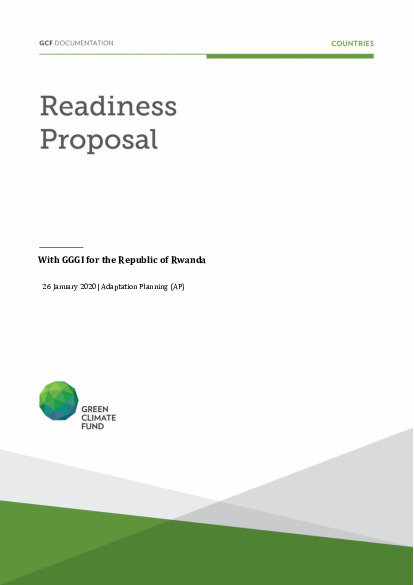Adaptation planning support through GGGI
Rwanda is undergoing rapid urbanization as one of its main economic growth and transformation drivers, while risks from climate change continues to pose a challenge. Although there have been past and on-going interventions in the area of building climate resilience and adaptation, limited, if any, activities focus on interventions related to urban and the built environment.
This National Adaptation Plan (NAP) Readiness project therefore aims to enhance Rwanda’s capacity to respond to climate change in high-risk zones by implementing a NAP for integrated flood and landslide management in urban areas. This will be done by 1) developing the capacity of the National Designated Authority (NDA) and related institutions and, 2) strengthening coordination with relevant stakeholders to plan and respond to the most urgent needs for mitigating climate-induced risks and hazards.
This proposal addresses the gaps assessed through 1) the National Risk Atlas of Rwanda, which includes landslide hazard assessment using the Spatial Multi Criteria Evaluation (SMCE) process and flooding hazard assessment using the GIS Flood Tool (GFT) (2018), 2) the identification of priority and at-risk areas in the urbanization planning process as part of the master plan and district development strategies (DDS) (2019), and 3) through a consultative process with representatives from key institutions (see Annex 1) that has identified five critical gaps as follows:
i) Lack of coordination. Limited multi-stakeholder cooperation and inter-ministerial coordination exists for flood and landslide resilience across national and sub- national actors, civil society and private sector stakeholders;
ii) Lack of private sector engagement on issues of resilience and adaptation for flood management;
iii) Limited access to finance and the need to mobilize international and domestic resources with an emphasis on securing co-financing from national sources;
iv) Lack of awareness (and in some areas capacity) of key stakeholders;
v) Limited monitoring and evaluation of existing and upcoming interventions; and
vi) Lack of technical studies for effective storm water and landslide management in Kigali City and urban areas outside Kigali experiencing rapid growth that are highly vulnerable to floods and landslides.
The activities outlined in this proposal are aligned with and in response to critical needs highlighted by the Government of Rwanda (GoR)’s Assessment of Climate Change Vulnerability in Rwanda (2019) and National Rainwater Harvesting Strategy (2016), both of which specified a lack of integrated management, the fragmentation and poor coordination between institutions, and inadequate monitoring and evaluation of interventions.1 The proposed activities aim to bridge the gap between various entities responsible for the planning and prevention of landslides and flooding including the Ministry of Infrastructure, the Ministry of Environment, the Ministry in Charge of Emergency Management, Meteo Rwanda, and sub-national entities including the City of Kigali. The proposal aims to substantially strengthen the coordination required for planning and collaboration in preparation for the projected increase in severity and frequency of landslides and flooding and their impact on the rapidly urbanizing centers in Rwanda. These areas of intervention have been developed in a consultative process led by the GoR and validated in collaboration with stakeholders at both the national and sub-national level. Therefore, the decision to focus on flood and landslides risks for this proposal was based on government’s highest priority to ensure that past and ongoing adaptation interventions related to flood risks and landslides especially in the urban areas are translated into concrete projects and impacts beyond assessments and studies. See Annex 1 for consultations and meetings conducted in preparation of the proposal.
